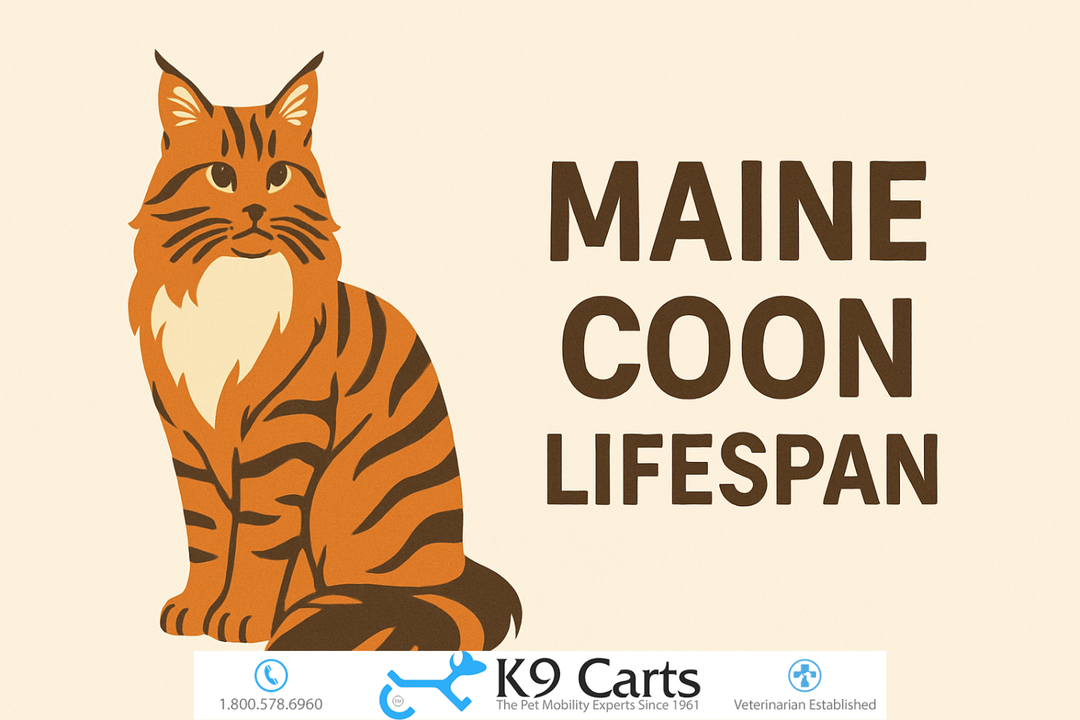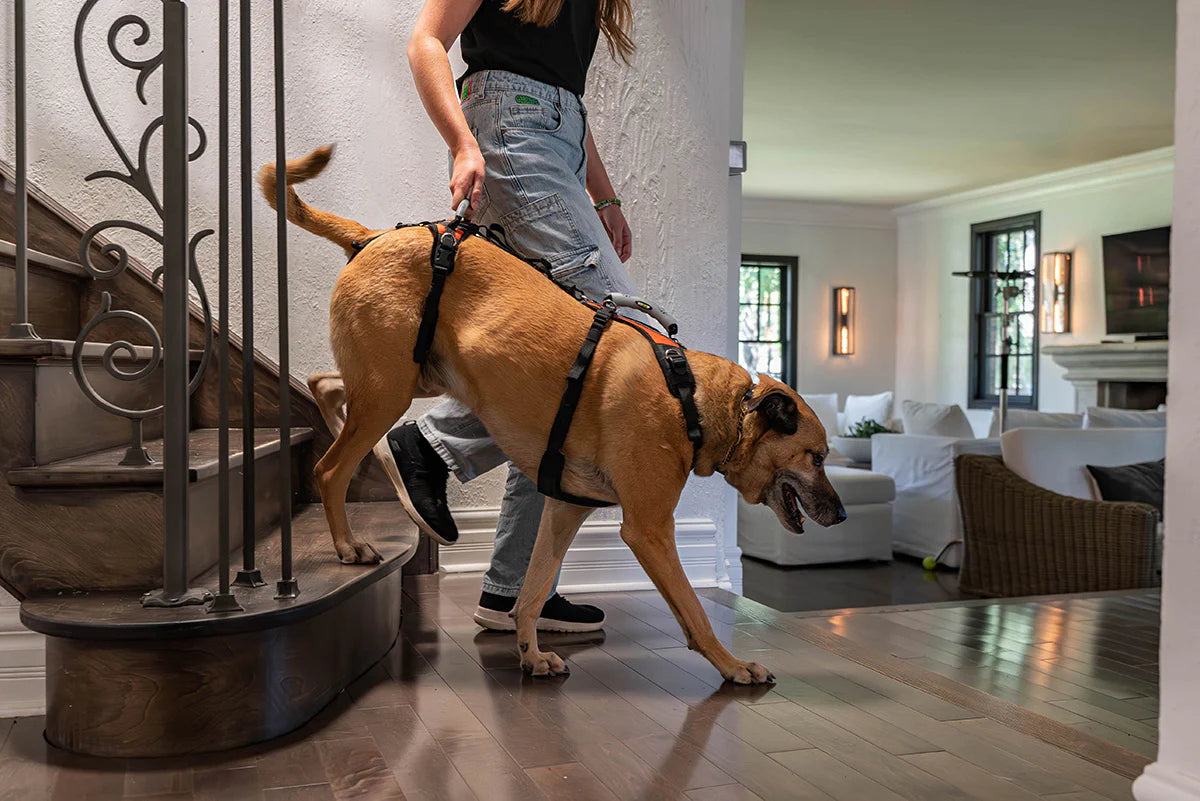How Long Do Maine Coons Live? Average Lifespan and Care Tips

Maine Coon cats are one of the most popular cat breeds in the United States, loved for their gentle nature, large size, and thick, luxurious coats. But before adopting one or caring for an aging Maine Coon, it's important to understand how long these cats typically live, what affects their lifespan, and how to help them stay healthy throughout their lives.
This page offers a detailed overview of the average lifespan of Maine Coon cats, the factors that influence their longevity, and the best care practices to ensure they live a long, comfortable life. We’ll also address common health issues and mobility concerns that may arise as Maine Coons age, along with solutions to support their quality of life during their senior years.
What is the average lifespan of a Maine Coon cat?
Maine Coon cats typically live between 12 to 15 years, although many healthy individuals reach 16 to 18 years with proper care. Some have been known to live into their early 20s, but this is less common and usually depends on a mix of good genetics, diet, and attentive care.
When compared to other cat breeds, this lifespan is fairly average. However, Maine Coons are a large breed, and larger animals generally have shorter lifespans than smaller ones. That’s why understanding their specific health needs is critical if you want your Maine Coon to reach its full life expectancy.
What factors influence the lifespan of a Maine Coon?
Several factors play a role in how long a Maine Coon will live. These include:
Genetics
A Maine Coon’s genetic background has a significant impact on its overall health and risk of inherited conditions. Reputable breeders test for common genetic diseases, which can reduce the risk of early death. If you're adopting from a shelter or unknown background, it may be difficult to know their genetic risks.
Diet and nutrition
Maine Coons need a diet that supports their large frame and muscular build. Low-quality food or improper portion control can lead to obesity, which is one of the top health risks for this breed. On the other hand, a well-balanced, high-protein diet can help them maintain strong muscles and support heart health.
Exercise and activity
Although not as hyperactive as some breeds, Maine Coons are playful and benefit from regular movement. Exercise prevents obesity and helps with mental stimulation, both of which are important for long-term health.
Veterinary care
Routine checkups and early detection of diseases can greatly improve life expectancy. Vaccinations, dental cleanings, and preventive care are all essential. Blood work and physical exams should be done yearly, or more often as the cat ages.
Indoor vs. outdoor lifestyle
Indoor Maine Coons tend to live longer than those who go outdoors. Outdoor cats are more exposed to accidents, predators, toxins, and diseases. Keeping your Maine Coon indoors or in a secure outdoor enclosure can help reduce those risks significantly.
What health problems are common in Maine Coons?
Maine Coons are generally healthy, but they are more prone to certain health issues than other breeds. Knowing what to look for can help with early intervention and better outcomes.
Hypertrophic cardiomyopathy (HCM)
HCM is the most common heart condition seen in Maine Coons. It causes the walls of the heart to thicken, which can lead to heart failure. Symptoms may include labored breathing, lethargy, or sudden collapse. Genetic testing and echocardiograms can help detect HCM early.
Hip dysplasia
Due to their size, Maine Coons can develop hip dysplasia, where the hip joint doesn’t form properly. This can cause pain, stiffness, and reduced mobility. Although more common in dogs, it’s a serious issue in Maine Coons and may worsen with age.
This is one area where assistive mobility devices, like custom-built wheelchairs, can help senior cats move more comfortably and maintain a good quality of life. At K9 Carts, we’ve worked with many aging cats who benefit from support during their golden years.
Spinal muscular atrophy (SMA)
This inherited disorder affects the spinal cord’s motor neurons, causing muscle weakness and atrophy. While not painful, it does affect coordination. Genetic testing can determine if a cat is a carrier or affected.
Polycystic kidney disease (PKD)
This condition causes fluid-filled cysts to develop in the kidneys, eventually leading to kidney failure. Although less common in Maine Coons than in Persians, it can still occur and should be screened for.
How can I help my Maine Coon live longer?
Helping your Maine Coon live a longer life involves consistent care and attention to their changing needs.
Feed a high-quality diet
Choose a diet rich in animal protein and balanced with essential nutrients. Avoid foods with fillers or artificial additives. Portion control is equally important to prevent obesity.
Keep them mentally and physically active
Interactive toys, puzzle feeders, and daily playtime help keep Maine Coons stimulated. Scratching posts and climbing towers also support muscle strength and flexibility.
Prioritize preventive veterinary care
Regular vet visits can detect diseases before they become advanced. Stay current on vaccines, flea and tick prevention, and dental cleanings. Routine lab work is especially important for aging cats.
Maintain a healthy weight
Obesity increases the risk of arthritis, diabetes, heart disease, and reduced mobility. Monitor your cat’s weight, and if they begin to gain, work with your vet on a feeding and exercise plan.
Create a safe and calm environment
Maine Coons appreciate routine and low-stress environments. Reduce exposure to loud noises or unfamiliar pets. Provide them with cozy spots to rest and areas they can retreat to when they want space.
What mobility issues do senior Maine Coons face?
As Maine Coons age, mobility can become a concern. Joint problems, arthritis, or hip dysplasia may limit their ability to climb, jump, or even walk comfortably.
Signs of mobility issues
-
Hesitation to jump onto furniture
-
Stiffness when getting up
-
Limping or favoring one leg
-
Reduced activity or grooming
-
Accidents outside the litter box
If your Maine Coon shows any of these signs, it’s time to consider supportive care.
Supporting mobility with assistive devices
Mobility aids such as custom cat wheelchairs can make a significant difference in a senior Maine Coon’s quality of life. At K9 Carts, we design lightweight, fully adjustable wheelchairs specifically for cats with rear leg weakness, arthritis, or neurological conditions. These devices can help your cat move around with more ease, regain some independence, and stay active longer.
Many cat parents are surprised to learn that wheelchairs aren't just for dogs. Cats adapt well to mobility carts, especially when introduced gradually and fitted correctly. Since Maine Coons are larger cats, custom fitting is even more important to provide optimal support and comfort.
How do I care for a senior Maine Coon?
Caring for an aging Maine Coon involves adjusting their routine, monitoring for health changes, and making your home more accessible.
Adjust their environment
Place ramps or stairs near furniture to help them reach their favorite spots. Make sure litter boxes have low sides for easy entry. Keep food and water in easily accessible areas.
Monitor for cognitive decline
Senior cats can experience feline cognitive dysfunction, similar to dementia. Signs include confusion, altered sleep patterns, and vocalizing more at night. Your vet can recommend strategies to manage these changes.
Support joint health
Supplements like omega-3 fatty acids, glucosamine, and chondroitin can help maintain joint function. Talk to your vet before starting any supplement.
Show patience and affection
Senior cats may need more attention and reassurance. Spend time with them daily, keep their routine predictable, and speak gently. Touch can be calming, especially when mobility is reduced.
Frequently Asked Questions
What is the longest a Maine Coon cat has ever lived?
The longest recorded lifespan for a Maine Coon cat is 31 years. While this is not typical, it does happen in rare cases where genetics, diet, environment, and consistent veterinary care align well. Most Maine Coons live between 12 and 15 years on average.
Reaching 20 years requires a high-quality diet, regular exercise, minimal stress, and early detection of health problems. Indoor living and access to preventive vet care also play an important role in helping a Maine Coon live longer than average.
Are Maine Coons considered a healthy breed overall?
Yes, Maine Coon cats are generally considered a healthy breed, but they are prone to a few inherited health issues. The most common concerns include hypertrophic cardiomyopathy (a heart disease), hip dysplasia, and spinal muscular atrophy. These conditions vary in severity and can sometimes be managed with medication or supportive care.
Regular checkups, genetic screening, and early diagnosis help minimize health risks. Choosing a breeder who tests for genetic diseases is important for long-term health, especially with a breed of this size.
At what age is a Maine Coon considered a senior cat?
Maine Coon cats are typically considered seniors around the age of 10. While some health changes may begin earlier, most cats start to show more obvious signs of aging between 10 and 12 years.
These signs can include reduced energy, joint stiffness, weight changes, or changes in grooming habits. Because Maine Coons are a slow-maturing breed, they may remain playful and active well into their middle years. Once they reach senior status, annual vet visits should increase to twice a year for more thorough health monitoring.
How can I tell if my senior Maine Coon is in pain or discomfort?
Signs that a senior Maine Coon may be in pain or discomfort include reluctance to jump, changes in posture, limping, reduced grooming, withdrawal, irritability, or vocalizing more than usual. You may also notice changes in eating habits, litter box behavior, or sleep patterns.
Cats are skilled at hiding pain, so even small behavioral changes should be taken seriously. A veterinary exam can help identify issues such as arthritis, dental disease, or internal organ problems that could be causing discomfort.
Do Maine Coons have mobility problems as they age?
Yes, aging Maine Coon cats are prone to mobility issues such as joint stiffness, hip dysplasia, or arthritis. These conditions can make climbing, jumping, or even walking difficult. You may notice your cat avoiding stairs, slipping on smooth floors, or needing help to reach furniture.
In moderate to severe cases, mobility aids such as ramps or custom-built wheelchairs for cats can help improve comfort and allow them to stay active. Early intervention with joint supplements and weight control can slow the progression of these issues.
Is it safe to use a wheelchair or mobility aid for a Maine Coon?
Yes, it is safe and often beneficial to use a properly fitted wheelchair or mobility aid for a Maine Coon with rear leg weakness, arthritis, or other movement issues.
Custom-built wheelchairs designed specifically for cats, such as those from K9 Carts, are lightweight and adjustable to fit the Maine Coon’s larger size and body structure. These aids can improve mobility, reduce pressure on painful joints, and allow the cat to remain active. They are especially helpful for cats recovering from injury or managing long-term neurological conditions.
Should Maine Coons be kept indoors to live longer?
Keeping Maine Coon cats indoors generally helps them live longer, safer lives. Indoor cats are protected from car accidents, predators, parasites, toxins, and infectious diseases. Outdoor access increases the risk of injuries or exposure to illnesses such as feline leukemia or FIV.
If you want your Maine Coon to enjoy the outdoors safely, consider using a secure catio or leash training them for supervised outdoor time. Indoor cats tend to live several years longer than those with unsupervised outdoor access.
What should I feed my Maine Coon to support a longer life?
To support a longer life, feed your Maine Coon a high-quality, protein-rich diet formulated for adult or senior cats. Look for foods that list real meat as the first ingredient and avoid those with fillers like corn, soy, or artificial additives.
Because Maine Coons are a large breed, they benefit from joint-supporting nutrients such as omega-3 fatty acids, glucosamine, and chondroitin. Keep treats limited, and monitor portion sizes to prevent obesity. Fresh water should always be available, and feeding wet food can help increase hydration.
How often should a senior Maine Coon see the vet?
Senior Maine Coons should see the vet at least twice a year for a full physical exam and routine blood work. These visits help detect early signs of diseases such as kidney disease, diabetes, and hyperthyroidism.
More frequent visits may be needed if the cat has chronic conditions or is on medication. Annual dental cleanings are also important, as dental disease can lead to pain, infections, and heart problems. Keeping up with preventive care is one of the most effective ways to extend your Maine Coon’s life.
Can Maine Coons live comfortably with chronic conditions like arthritis or heart disease?
Yes, Maine Coon cats can live comfortably with chronic conditions like arthritis or heart disease when managed properly. For arthritis, treatment may include anti-inflammatory medication, joint supplements, weight management, and mobility aids like ramps or custom carts.
For heart disease such as hypertrophic cardiomyopathy, treatment often involves medication, a low-stress environment, and routine cardiac monitoring. With the right veterinary care and home adjustments, cats with chronic conditions can still enjoy a good quality of life for several years.








